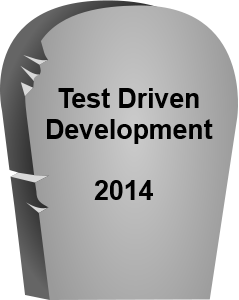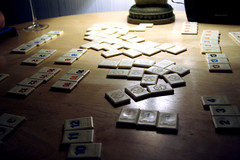Date: Thursday 26th June 2014
Time: 19:00
Venue: Staffordshire University – Stafford Campus (Octagon building, K102)
Fear not, TDD is not dead, although it’s certainly been talked to death this month. This catchy title has been doing the rounds on the web recently since the Kent Beck + Martin Fowler + David Heinemeier Hansson talks. This month we are going to take a look at it ourselves, try out some different approaches and share our experiences.
For me it all started about 2 months ago when I watched Ian Cooper’s talk on TDD, Where did it all go wrong. I’ve been told over and over, that unit testing gives you the freedom to change code with the safety of maintaining functionality for the customer. So refactoring is the process of changing code without changing functionality, and those like Kent Beck would advocate your test suites allow you to safety refactor to design patterns as they emerge in the system. Yet this video struck a chord, I struggle to refactor code without breaking tests, and so lose confidence that the functionality is unchanged as the tests are now different. Ian’s video addresses these points by highlighting different approaches and definitions to unit testing, and asks is the way some of use do TDD slowing us down.
We are going to explore this issue by scratching an itch many of you had during last months lean coding challenge, Refactoring! After a quick summary of Ian’s video, we are going to pair up and refactor a completed C# implementation of last months Checkout Code Challenge. It will be covered by two test suites. One set focusing on implementation per method and another suite on behaviour of the system. After an hour of coding we will break for a retrospective to find out how everyone’s refactoring was influenced by the different test suites, the advantages each way of testing has to offer and insights into TDD for agile development.
As we’re going to be writing code in C#, bring your laptop with visual studio set up – Project Code on GitHub
If you’re interested, please sign up on meetup.com
See you there!
Jon Willis



